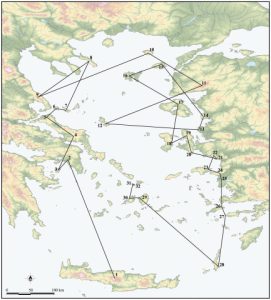3 Apollo’s power over the islands of the Aegean: 23-44
Apollo's Power and Leto's Journey across the Aegean Islands: 23-90
Section I:
Apollo’s Birth, Delos, and the islands of the Aegean
Should I, instead, sing of
places
those which bring pleasure to you in their beauty:
peaks and rolling foothills of high mountains,
rivers flowing into the ocean,
beaches and harbors alongside the sea?
Or perhaps I should sing of
firsts?
[Of how things came to be as they are?]
that first beginning, when
Leto
delivered you
presenting a gift to all mortals[2] 25
[birthing a remedy for the harsh fates given by heaven.]
bent over in labor,
facing the hillside of Mount Cythnus
on rocky, desolate,
Delos:
island-surrounded-by-the-sea.
On every side, shrill-whistling winds
drive ominous waves upon her shore.
This is your first:
And from this first moment,
from this first place,
your rule and benefit to mortals spreads
until it reaches and echoes back from every land:
[the rich Peloponnese
across Europa (Thrace and Thessaly), and
throughout the water-circled Aegean islands.[4]
But the path starts here first,
with your power in the Aegean.]

Apollo’s Dominion (I):
The Islands and Aegean Seacoast
First,
it starts with those
who hold cities on the island of Crete, 30
[and travels] north, up to the city of the Athenians
in sight to the left, the island of Aigina,
but it proceeds to the right, northwest,
along the long coastal shores of Euboea
reaching the harbor cities of Aegai, Iresiai
passing the island beaches of Peparethus.
and crosses into the Aegean.
[Now, a fork:]
[Either–]
it bends north around the coast to the Thracian lands:
northeast, to the peninsula called Athos
after leaving behind mount Pelion
further east to the island of Samos(thrace)
before you, the shadowy range of Ida.
[Or instead –]
East from Peparethus:
to the island in the center of the sea: Skyros
Then further to the coast and Phocaea
your guide: the far-away peak of Autokane. 35
[Here, the paths rejoin]
In order between Samos and Phocaea:
bustling-and-busy-Imbros;
smoke drifting into the sky: inhospitable Lemnos
and the most holy island of Lesbos
— famous kingdom of Macar, son of Aeolus.
[Heading south now, along the coast–]
it appears shining-white-in-the-sea : Chios
within sight on the coast,
the rocky summits of Mimas and Corycus
further, past the city which gleams in the sun: Klaros,
staying in the shadow of the peak of Aisagea. 40
Next, the island forever wet-from-the-sea-spray: Samos
across from the tall Mt. Mycale
past the city of Miletus
and the neighboring island of Kos,
–where the Meropians have their city.
ending at that island buffeted-by-the-ocean-winds: Karpathos
and the heights of lofty Mt. Knidos..
Finally, the path turns back to the center of the sea,
northwest, reaching the islands of Naxos,
Paros
and rocky Rheneia.
Until…
- We will see in section 2's preamble that the ideas introduced here are popula potential themes that have been rejected but COULD have been followed up on (in that case the stories of Apollo's love affairs). Here though, the hymnist does something clever -- although a pastoral poem which praises the natural haunts of Apollo is rejected, in singing of his birth, the Hymnist actually creates space to sing about all of these places --first by listing the power of Apollo/journeys of Leto and then by discussing Delos which is explicitly made superior to all of these other places (despite being ugly). In essence then, the idea of 'places which bring pleasure to you' IS sung about but the formulaic ending is reversed and what ACTUALLY brings pleasure to Apollo is surprising. ↵
- The idea of Apollo AS an intentional gift for mortals is an interesting one that is not often explored. Of course, the idea of gifts -- both owed and given -- are hugely thematically important for this section. ↵
- Like the labor of Leto itself, the birth of Apollo keeps getting put off -- we are again introduced to the short theme (here in the position which suggests it is the theme of the section) but are AGAIN diverted from actually completing it -- instead diverting into the journey of Leto and the reason his birth is delayed. Leto and the reader are put in the same position. ↵
- Although added here to clarify, the three-fold division of Apollo's domain into sea, mainland, and 'the north' becomes clear as the hymn develops. Stating it here helps prepare the reader for the three 'mapping' excursions that the hymnist inserts to highlight the different regions. ↵

